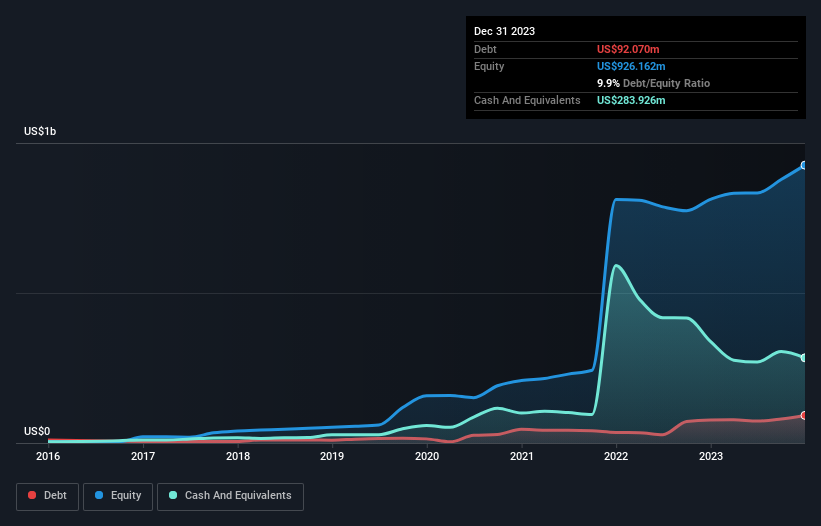- United States
- /
- Semiconductors
- /
- NasdaqGM:ACMR
ACM Research (NASDAQ:ACMR) Has A Pretty Healthy Balance Sheet
David Iben put it well when he said, 'Volatility is not a risk we care about. What we care about is avoiding the permanent loss of capital.' When we think about how risky a company is, we always like to look at its use of debt, since debt overload can lead to ruin. We note that ACM Research, Inc. (NASDAQ:ACMR) does have debt on its balance sheet. But is this debt a concern to shareholders?
Why Does Debt Bring Risk?
Debt and other liabilities become risky for a business when it cannot easily fulfill those obligations, either with free cash flow or by raising capital at an attractive price. Ultimately, if the company can't fulfill its legal obligations to repay debt, shareholders could walk away with nothing. While that is not too common, we often do see indebted companies permanently diluting shareholders because lenders force them to raise capital at a distressed price. By replacing dilution, though, debt can be an extremely good tool for businesses that need capital to invest in growth at high rates of return. The first step when considering a company's debt levels is to consider its cash and debt together.
See our latest analysis for ACM Research
What Is ACM Research's Net Debt?
You can click the graphic below for the historical numbers, but it shows that as of December 2023 ACM Research had US$92.1m of debt, an increase on US$77.0m, over one year. However, it does have US$283.9m in cash offsetting this, leading to net cash of US$191.9m.

A Look At ACM Research's Liabilities
We can see from the most recent balance sheet that ACM Research had liabilities of US$500.7m falling due within a year, and liabilities of US$64.1m due beyond that. Offsetting these obligations, it had cash of US$283.9m as well as receivables valued at US$323.3m due within 12 months. So it actually has US$42.4m more liquid assets than total liabilities.
This surplus suggests that ACM Research has a conservative balance sheet, and could probably eliminate its debt without much difficulty. Simply put, the fact that ACM Research has more cash than debt is arguably a good indication that it can manage its debt safely.
On top of that, ACM Research grew its EBIT by 62% over the last twelve months, and that growth will make it easier to handle its debt. When analysing debt levels, the balance sheet is the obvious place to start. But ultimately the future profitability of the business will decide if ACM Research can strengthen its balance sheet over time. So if you want to see what the professionals think, you might find this free report on analyst profit forecasts to be interesting.
But our final consideration is also important, because a company cannot pay debt with paper profits; it needs cold hard cash. ACM Research may have net cash on the balance sheet, but it is still interesting to look at how well the business converts its earnings before interest and tax (EBIT) to free cash flow, because that will influence both its need for, and its capacity to manage debt. Over the last three years, ACM Research saw substantial negative free cash flow, in total. While that may be a result of expenditure for growth, it does make the debt far more risky.
Summing Up
While it is always sensible to investigate a company's debt, in this case ACM Research has US$191.9m in net cash and a decent-looking balance sheet. And we liked the look of last year's 62% year-on-year EBIT growth. So we are not troubled with ACM Research's debt use. The balance sheet is clearly the area to focus on when you are analysing debt. However, not all investment risk resides within the balance sheet - far from it. To that end, you should learn about the 3 warning signs we've spotted with ACM Research (including 1 which shouldn't be ignored) .
When all is said and done, sometimes its easier to focus on companies that don't even need debt. Readers can access a list of growth stocks with zero net debt 100% free, right now.
New: Manage All Your Stock Portfolios in One Place
We've created the ultimate portfolio companion for stock investors, and it's free.
• Connect an unlimited number of Portfolios and see your total in one currency
• Be alerted to new Warning Signs or Risks via email or mobile
• Track the Fair Value of your stocks
Have feedback on this article? Concerned about the content? Get in touch with us directly. Alternatively, email editorial-team (at) simplywallst.com.
This article by Simply Wall St is general in nature. We provide commentary based on historical data and analyst forecasts only using an unbiased methodology and our articles are not intended to be financial advice. It does not constitute a recommendation to buy or sell any stock, and does not take account of your objectives, or your financial situation. We aim to bring you long-term focused analysis driven by fundamental data. Note that our analysis may not factor in the latest price-sensitive company announcements or qualitative material. Simply Wall St has no position in any stocks mentioned.
About NasdaqGM:ACMR
ACM Research
Develops, manufactures, and sells capital equipment worldwide.
Good value with proven track record.
Similar Companies
Market Insights
Community Narratives



